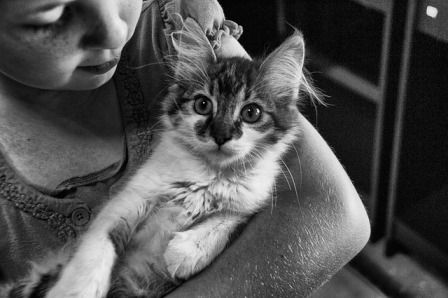How Can Child Benefit from Relationship with Pets?
How Can Child Benefit from Relationship with Pets?
Modern day childhood is unthinkable without tablets, computers, e-readers, and internet. Children’s daily lives are to a large degree influenced by modern technology; technology is omnipresent, whether they try to read, socialize, or entertain themselves. Today’s children spent a little time in nature and in contact with animals. However, technology by itself is a great human accomplishment, and for our children is unavoidable. In order to assist a child to lessen its dependency on technology, we, as parents, have to offer children choices. One of ideas to help a child to change the focus from technology and a sedentary lifestyle to a more humane and physically active childhood, and help the child to develop a good contact with nature is by adopting a pet. The article “The Pet Program” describes three ways in which the child can benefit from a relationship with pets.
How Can Child Benefit from Relationship with Pets?
Physical
“Pets provide an impetus for running and practicing motor skills,” says Sheryl Dickstein, Ph.D., Director of Humane Education for the ASPCA. Walking a dog or running in the yard and throwing a ball are great ways to exercise the dog as well as for children to get away from sedentary indoor activities and move around. Small motor skills can be encouraged by allowing children to scoop food and pour water into dishes, and by helping to groom them. Depending on the child’s age, parental supervision is recommended for both the child’s and the pet’s safety.
Social
For children especially, pets can be wonderful social facilitators. Children are more prone to approach and interact with another child who is playing with a pet. In this way, a pet can be the bridge between a less socially outgoing child and other potential playmates.
A pet itself can be a social object for children because of the nature of their relationship. “Because animals accept us for who we are, pets give some practice in a social relationship,” says Dickstein.Emotional
Pets can facilitate various aspects of emotional development such as self-esteem and a sense of responsibility. Says Dickstein, “As kids age and take on more of the care for the pet, it helps to build self-confidence.” She points out however, that it is a misunderstood fact that pets teach children responsibility. “Parents teach responsibility,” explains Dickstein, “Pets just make a good vehicle for learning.”
Cognitive
As children grow, they may develop an interest in a specific type or breed of animal. Encouraging children to read about their favorite pet or to take part in obedience classes with a parent and the pet can all encourage a child’s cognitive development as it sparks the desire for learning. Bringing the child along to a veterinarian appointment will give him a chance to ask questions about proper care and his pet’s health.
As we have seen, pets can have a crucial role in children’s development on various levels. This is especially important for children who do not have siblings. Not only pets help children with physical and cognitive development, but also assist them to develop emotionally and understand relationships. This child will express more interest in the outer world, in emotions and feelings of others, and will have more compassion for other beings. In this way, we encourage our children to spend more time in “real” world rather than in the “virtual” one. During human history, friendship with animals has been an important part of our lives, to a greater or lesser degree. And today it is critical, as never before. If we want our child to grow into well-balanced, strong, social, and emphatic human being, then owning a pet is a great way. From child-pet relationship would not benefit only the child, but our world as well.










